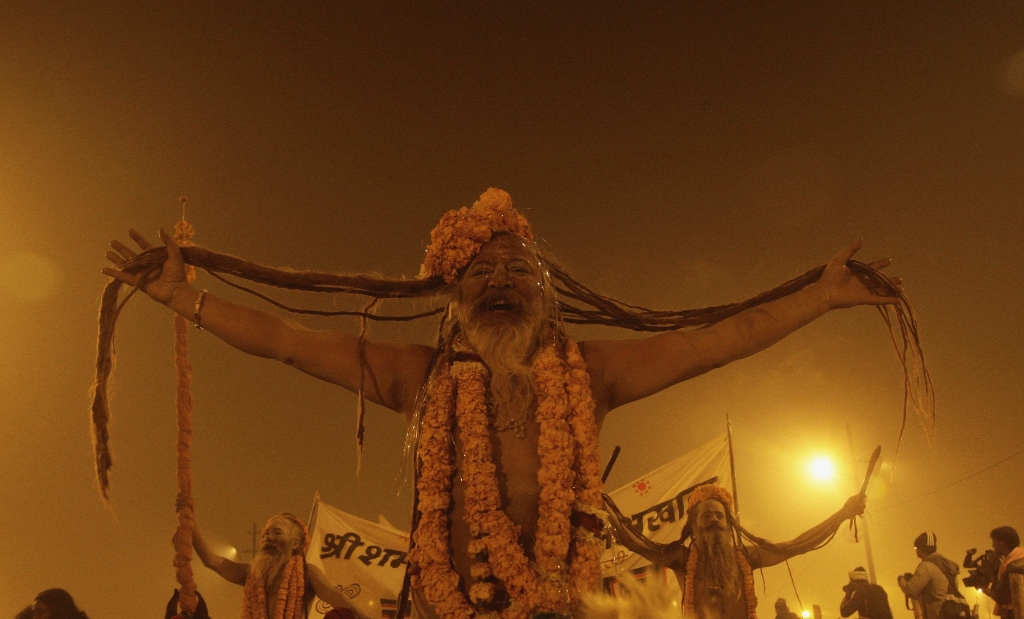
The Kumbh Mela in the Indian town of Allahabad will see up to 100 million worshippers gather over the next 55 days to take a ritual bath in the holy waters, believed to cleanse sins and bestow blessings.
Before daybreak on Monday, a day chosen by astrologers as auspicious, hundreds of gurus, some brandishing swords and tridents, ran into the swirling and freezing waters for the first bath, signalling the start of events.
Assorted dreadlocked holymen, seers and self-proclaimed saints from all over the country have assembled for the colourful and chaotic spectacle that offers a rare glimpse of the dizzying range of Indian spiritualism.
"I am ecstatic. When I enter the Ganges I feel so happy, it's a feeling I can't explain," said Mokshanand, a heavily bearded guru who emerged shivering from the water in a small pair of saffron-coloured underpants.
"Our biggest wish is that there is peace and that people should look after each other," a member of the Naga Sadhus, a devout, fierce and famously nude sect of followers of the Hindu god Shiva, told AFP.
For most ordinary Indians, the Kumbh Mela is a religious holiday enjoyed in an almost carnival atmosphere, where prayers and blessings are offered and sought alongside family or friends camping together at the vast festival site.
The hardships of being squeezed in the crowds, enduring endless whistling and barked orders from thousands of policemen and even catching a cold in the chilly January weather are seen as a price worth paying for a dip.
"I was a bit reluctant to go in at first because of the cold, but I was pushed into the river by the mass of people," Indu Bala Dhawan, a 70-year-old grandmother from western Punjab, told AFP.
"I yelled at first but I'm very happy now."
The Kumbh Mela takes place every 12 years in Allahabad, in northern Uttar Pradesh state, with smaller but similar events every three years in other locations around India.
It has its origins in Hindu mythology, which describes how a few drops of the nectar of immortality fell on the four places that host the festival – Allahabad, Nasik, Ujjain and Haridwar.
For men like Ram Krishna Verma, a 42-year-old farmer from the state of Chhattisgarh, who has travelled some 700km, it is a time of solemn duty as he has come to scatter the ashes of his late mother.
"She died two months ago," he told AFP. "This is the final resting place."
The "Mother Ganges" is worshipped as a god and is seen as both the giver and taker of life. Most devotees dunk their heads under the water, some drink it and others bottle it and take it home as gifts.
Police expect 250,000 people on Monday with 20 million anticipated on February 15, the most auspicious day. Overall, organisers are counting on about 100 million coming, the same number as in 2001.
The management of the festival requires a monumental effort – and a budget of INR16 trillion ($290 million) – but officials say everything is in place for a safe and successful event.
Senior state police officer Arun Kumar said the biggest concern was crowd control and the 12,000 officers on duty would be monitoring to guard against stampedes – a frequent and deadly occurrence at Indian religious festivals.
Organisers have set up 35,000 toilets, 14 medical centres, 22,000 street lights, 150km of temporary roads, 18 bridges, and new sewage facilities.
Nearly 7,000 buses and hundreds of special trains are expected to ferry people to Allahabad where the heavily polluted Yamuna river flows into the Ganges.
Despite its important role in Hinduism, the Ganges is tainted by industry and the settlements along its banks, which quickly turn the clear waters from the Himalayas into a murky, frothy brown downstream.
Local authorities have cracked down on untreated effluent from nearby factories and new drainage facilities have cut the immediate flow of raw sewage.
COMMENTS (8)
Comments are moderated and generally will be posted if they are on-topic and not abusive.
For more information, please see our Comments FAQ
1731570357-0/elon-musk-(1)1731570357-0-405x300.webp)
-(1)1717678110-0/Kendrick-(1)-(1)1717678110-0-165x106.webp)






1732445375-0/Untitled-design-(9)1732445375-0-270x192.webp)








100 Million People gathering , and they are only afraid of Stampede we here in Karachi cannot protect a single political rally without baning mobile phones. Hats Off to you India, Om Namoh Shiva .
Januja : Atleast the cities and streets in India are not soaked in human blood, unlike Pakistan.
This year the number of foreign, non-Hindu participants is simply astounding!
@blackjack
No thanks. And no offence I ll never want to experience it.
2.9 billion litres of raw human sewage are dumped in the ganges. Daily.
Pure, Clean, Rising, India.
This is an event that needs to be experienced - reading about it cannot possibly convey picture in entirety. I guess the same can be said about India itself.
scary picture!